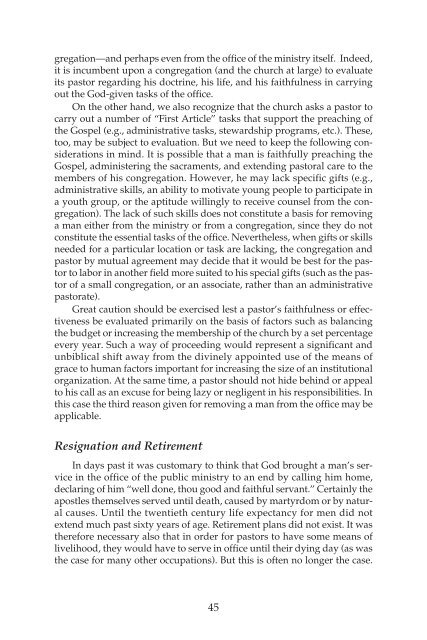45930 Divine Call CTCR final - The Lutheran Church—Missouri Synod
45930 Divine Call CTCR final - The Lutheran Church—Missouri Synod
45930 Divine Call CTCR final - The Lutheran Church—Missouri Synod
You also want an ePaper? Increase the reach of your titles
YUMPU automatically turns print PDFs into web optimized ePapers that Google loves.
gregation—and perhaps even from the office of the ministry itself. Indeed,<br />
it is incumbent upon a congregation (and the church at large) to evaluate<br />
its pastor regarding his doctrine, his life, and his faithfulness in carrying<br />
out the God-given tasks of the office.<br />
On the other hand, we also recognize that the church asks a pastor to<br />
carry out a number of “First Article” tasks that support the preaching of<br />
the Gospel (e.g., administrative tasks, stewardship programs, etc.). <strong>The</strong>se,<br />
too, may be subject to evaluation. But we need to keep the following considerations<br />
in mind. It is possible that a man is faithfully preaching the<br />
Gospel, administering the sacraments, and extending pastoral care to the<br />
members of his congregation. However, he may lack specific gifts (e.g.,<br />
administrative skills, an ability to motivate young people to participate in<br />
a youth group, or the aptitude willingly to receive counsel from the congregation).<br />
<strong>The</strong> lack of such skills does not constitute a basis for removing<br />
a man either from the ministry or from a congregation, since they do not<br />
constitute the essential tasks of the office. Nevertheless, when gifts or skills<br />
needed for a particular location or task are lacking, the congregation and<br />
pastor by mutual agreement may decide that it would be best for the pastor<br />
to labor in another field more suited to his special gifts (such as the pastor<br />
of a small congregation, or an associate, rather than an administrative<br />
pastorate).<br />
Great caution should be exercised lest a pastor’s faithfulness or effectiveness<br />
be evaluated primarily on the basis of factors such as balancing<br />
the budget or increasing the membership of the church by a set percentage<br />
every year. Such a way of proceeding would represent a significant and<br />
unbiblical shift away from the divinely appointed use of the means of<br />
grace to human factors important for increasing the size of an institutional<br />
organization. At the same time, a pastor should not hide behind or appeal<br />
to his call as an excuse for being lazy or negligent in his responsibilities. In<br />
this case the third reason given for removing a man from the office may be<br />
applicable.<br />
Resignation and Retirement<br />
In days past it was customary to think that God brought a man’s service<br />
in the office of the public ministry to an end by calling him home,<br />
declaring of him “well done, thou good and faithful servant.” Certainly the<br />
apostles themselves served until death, caused by martyrdom or by natural<br />
causes. Until the twentieth century life expectancy for men did not<br />
extend much past sixty years of age. Retirement plans did not exist. It was<br />
therefore necessary also that in order for pastors to have some means of<br />
livelihood, they would have to serve in office until their dying day (as was<br />
the case for many other occupations). But this is often no longer the case.<br />
45


